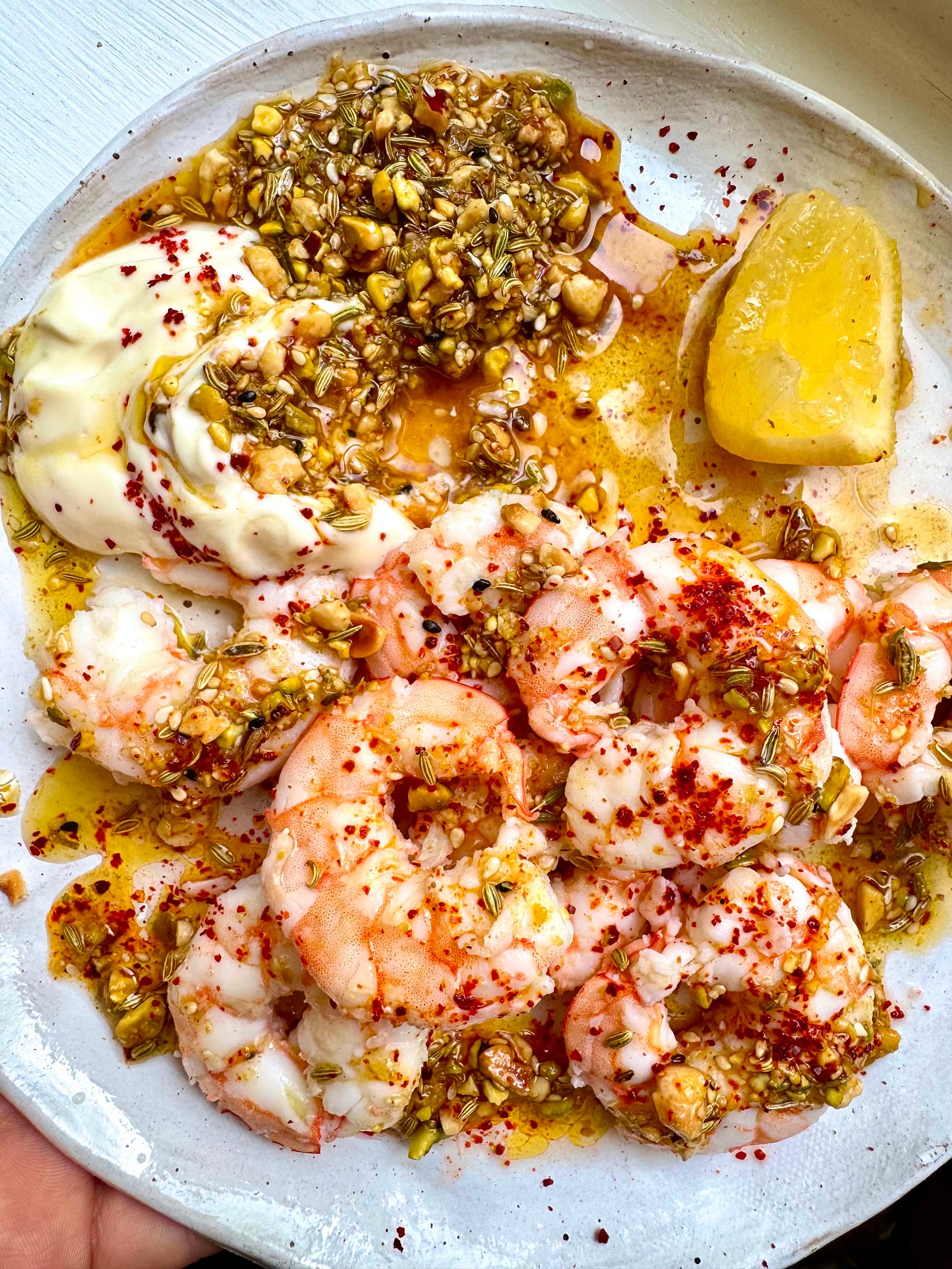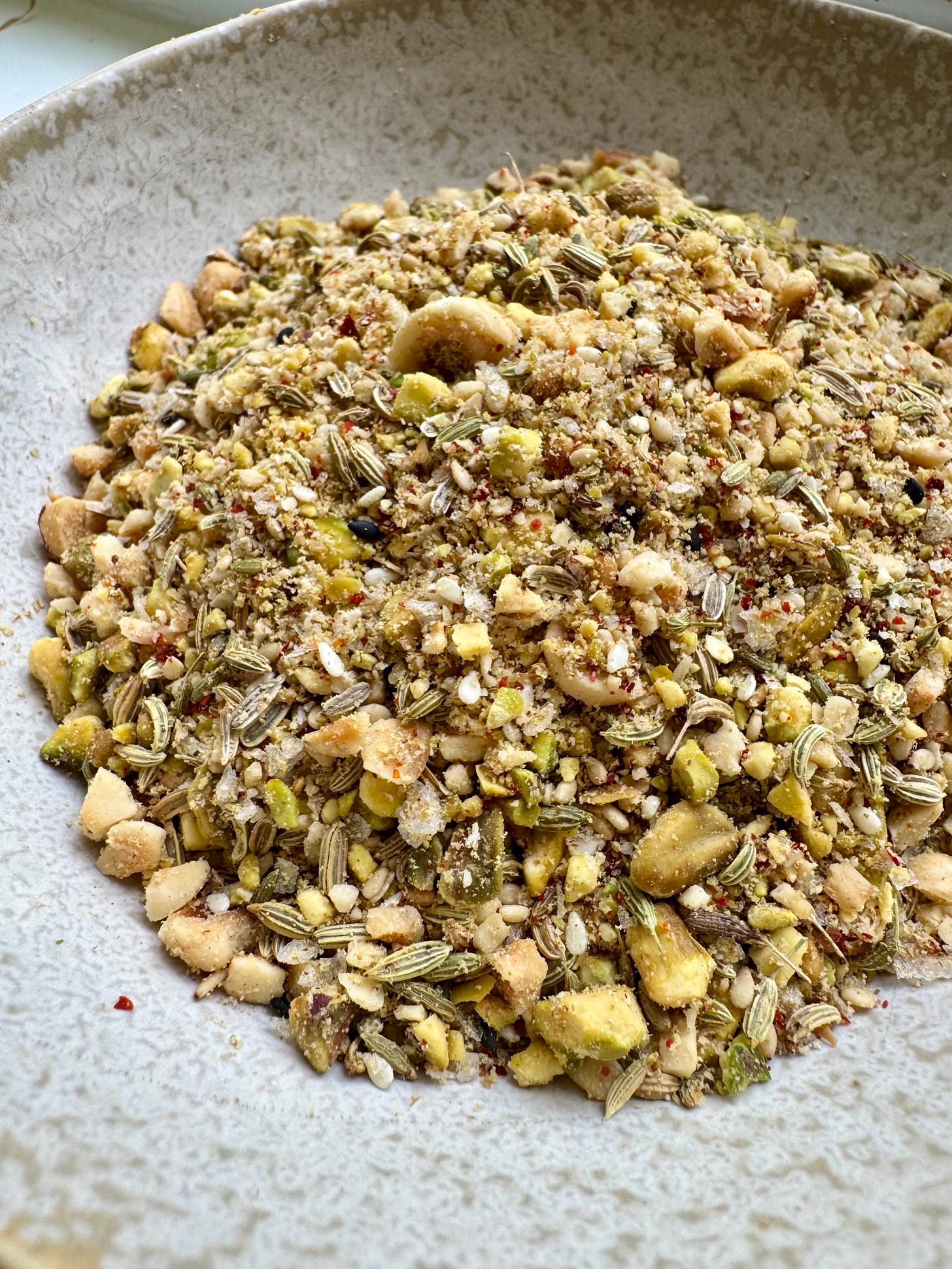The Ancient Egyptians are credited with many revolutionary inventions, including toothpaste, the plough, and clocks, so it’s unsurprising that their contributions to cookery were also huge.
They’re thought to have developed (or rather, accidentally discovered) the raised breadmaking process and bread became, and remains, a significant part of Egyptian cuisine. Consider Egypt’s advantageous position on ancient spice routes and their cultivation of olives, and the topping of bread with olive oil and dukkah (pronounced doo-kah) begins to make sense.
Dukkah contains various combinations of toasted nuts and spices, which are pounded (the word ‘duqqa’ is Arabic for ‘to crush’) in a pestle and mortar, resulting in a pleasing, uneven rubble - a little chunky, a little powdery. Perfect for flavour distribution. Sprinkled, it scatters far and wide, coating some areas with a soft, pulverised dust and others with jagged nubbins.
While many versions of dukkah contain fennel seeds, I like to go heavy with them when making a blend for seafood. A sprinkle of this served with a dip such as the mayo you see with the prawns above, or simply with some extra virgin olive oil and lemon juice, brings so much more fun to a simple plate of food. Not to mention texture!
I also like to mix it with some olive oil and then drizzle it over, where it becomes a dressing and crunchy garnish in one, a bit like this seeded salad dressing. We do love a multi-purpose invention. I wonder what the Ancient Egyptians would think of washer-dryers? Or the Swiss army knife?
Here are some more ideas for using your beautiful dukkah:
Grill scallops in their shells, then top with lemon juice and zest and a hearty sprinkle
Serve a whole fish with lettuce leaves for wrapping, plus crunchy vegetables and either a dipping oil and dukkah or a dairy-based sauce such as yoghurt and dukkah on top
Fennel also works well with pork, so try this with roasted pork belly, in lettuce wraps as above or with chops following a Middle Eastern vibe, for e.g with yoghurt and tabbouleh
Use it to crust fish fillets before baking
Sprinkle over hummus or other dips
Use it in sandwiches or wraps
Use it to crust a pastry as per this sesame-crusted galette
Try it with eggs, e.g. shakshuka, Turkish-style eggs with yoghurt or just over fried eggs
Take it to a BBQ and have on hand for all your grilled veg and chicken, lamb and so on.
Sprinkle over a tomato salad. It’s salad szn! Even a fairly plain green salad would love a bit of this. Also: panzanella.
CHEESE. I’d be sprinkling this on a goat cheese crostini situation, but also rolling labneh balls in it, using it to top cream cheese, showering it over honeyed halloumi, feta or even something like a milder brie or camembert
Add to beany/chickpea dishes for added flavour and CRONCH.
Fennel Dukkah for Seafood
Makes a nice little jarful
40g hazelnuts
2 tablespoons fennel seeds
50g pistachios
1 tablespoon toasted sesame seeds
1 teaspoon ground coriander
½ teaspoon ground cumin
1 teaspoon za’atar
1 teaspoon pul biber or cayenne, or to taste
1 tablespoon sea salt flakes
Heat a dry frying pan over medium heat and toast the hazelnuts until lightly golden in places, taking care not to burn them. Set aside
Add the fennel seeds and toast until fragrant, then set aside.
Add the hazelnuts and pistachios to a pestle and mortar and bash until you have a chunky rubble. Set aside.
Add the fennel seeds and give them just a light crush, leaving lots whole.
Combine everything in a bowl and mix well. Store in an airtight jar out of direct sunlight. It will keep for a couple of weeks.
I’ve mentioned it before, but Raey Tannahill’s Food in History is SO GOOD and relevant here.
And of course, this is a classic from Cairo-born Claudia Roden.
A recent piece on the food of Cairo with great pics (Condé Nast Traveller).
And a local’s perspective in Serious Eats, from last year.
On the collapse of Unbound and its terrible treatment of writers (The Critic).
From
on the process of writing cookbooks. If you’ve never done it or are interested, there are some valuable insights in this post. Writing cookbooks is HARD, and I made some of the same mistakes that Uyen mentions. She also talks about the promotion of books, which is the hardest part for me. You think you’ve finished the work by writing the book? Think again, my friend!Which reminds me: my book BBQ Days BBQ Nights has been picked up by Sainsbury’s for summer 2025! If you see it, I’d love it if you tagged me in a snap on social media. I haven’t been able to find it so far.
SUPERSIZE ME!
This week, it’s a fun way to use up your dukkah, which started life as an accompaniment for white fish (and remains an excellent one) but morphed into a dip while I was developing the recipe. Both ways are 10/10.
Until next time, Flavour Fans x










Love love love all the flavours in this (and am already a huge fan of Dukkah - I sometimes even do a sweet twist to have a Dukkah I can enjoy with desserts like labneh and roasted plums for example). Immediately adding this to my list of things to make this summer!